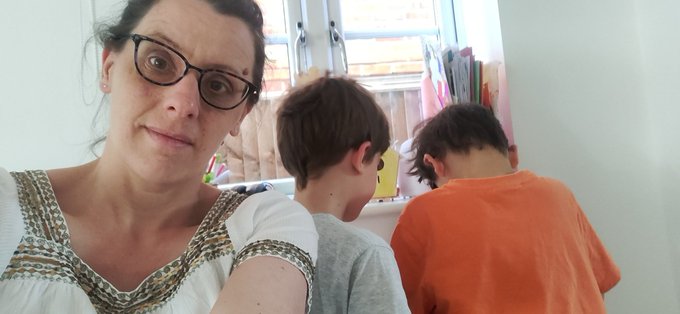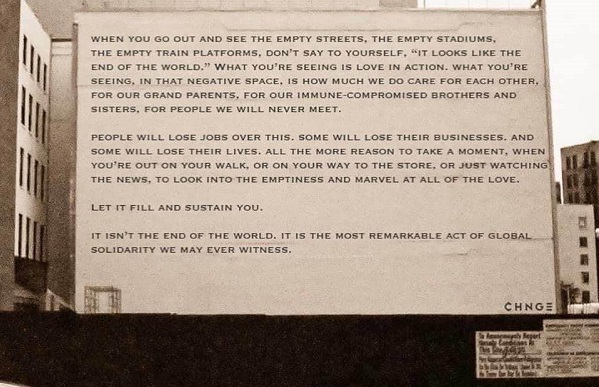Today, for the first time in months I am on my own.
I realise that others, on their own for months, might see this as no cause for celebration. The space and isolation can feel as oppressive as constant contact and noise.
Our need and preferences for space vary so much. Too much and we feel lost, alone. Too little and we feel cramped and irritable. And the ‘right’ amount can differ depending on our mood at the time.
I started this blog intending to write about the value of spacing out copy for better readability. I know, you can barely withhold your excitement right? I’ll get to it. But first please bear with me as I amble into a more philosophical terrain for a few paragraphs.
Space matters for all sorts of reasons

Why use another room when you can stand in almost exactly the same place as your parents?
This is me. Lockdown chic at its best. I was trying to work at the time, and for a reason known only to themselves, my kids decided they would use the tablet in the same square metre as me. I know other parents (of kids and pets) can relate. Indeed, another friend sent me a very similar picture of her two kids pretty much sitting on top of her as she tried to relax for a few minutes.
Children love this lack of space and close contact. Indeed, it’s known that mammals need to be cuddled. It builds up our bodily systems, reduces stress and helps us sleep. I remember crowding my parents as a child – a mark of dependency we become keen to lose as we enter those teenage years. I try to remind myself that one day these moments of full-on physical affection will stop and to enjoy them – as much as that’s possible – while they’re still a feature.
This lack of space and the constant noise has felt wearing. But as I pad around my newly empty home, I feel alone. As if someone turned the volume down unexpectedly. It’s not the release I hoped it would be.
Space can absolutely feel like a bad thing. A new space at the table. An empty bedroom. An unslept-in side of the bed. It can be easy to forget – for a moment or two – that you’ve lost someone. Then the extra space reminds you. Perhaps for a fleeting instant, you hear or catch a glimpse of that precious person. But no… there’s nothing but space.
Space to think
We’ve been encouraged to think of the sudden presence of space in our towns and cities as a good thing. As a sign of our respect for one another and our love for one another. By staying home and staying safe we were helping one another and helping the country.

Quite what this means for the ones To Whom The Rules Do Not Apply as they drove to ageing parents and family members many miles away we can only speculate. Their insistence that rule-breaking was acceptable because it was done with integrity has been questioned enough.
Space can feel ridiculous. We step into the road to avoid walking to close to others. It feels like contemporary dance. As if we’re choreographing our public lives. “Yes of course I’ll stand against these nettles so you can walk past”. We Brits have embraced this distancing with surprising ease.
But now we also pull our children back as they cheerfully run near to others. It gets me every time. What are we doing to our kids? Will this constant talk of “don’t get close” backfire? How will they build relationships as teens and adults if leaving a gap between one another becomes habit? Perhaps it will become the teenage rebellion of future years. Flouting social norms by grouping together, standing near others, sitting on the lap of someone you don’t know.
The final frontier? No thank you
And then there’s Elon. I feel as if I am one of the few people who couldn’t give a monkey about his mission into space. There seem to be so many more Earthly matters to contend with. And honestly, I couldn’t think of anything worse than going into space. For one, I can’t get past the irony of the situation. People are paying to be blasted off our beautiful planet into an environment that’s so vast it’s called “space”. All the while, they’re shut into a room no larger than my office (and believe me, that’s small) with several other people.
Crikey, I’ve gone on a bit, haven’t I? Onto more writerly matters.
Space matters when you’re writing.
Clumping everything up into one big paragraph turns what could be inspiring, motivating or amusing into a verbal scrummage.
How can you get your message across when the reader doesn’t know where the important points are?
Listening to comedians emphasises this brilliantly. A good comedian always pauses to let the audience get the joke. It’s their paragraph break. Their white space. Listen to the audience’s reaction. Initially, they titter politely. And then, when they fully comprehend the joke, they roar with laughter.
This is a great excuse to get Phoebe Waller-Bridge into my post. Her silence – the space – whilst talking about genitals (yes, that’s what I meant to write) is all the more hilarious because of her silence. She lets her audience fill in the gaps and appreciate what she just said. It’s at around 4.30 minutes into the reel if you’re interested. (And I know you are.)
Another reason that space matters when you’re writing.
I’ll fully confess to having lost some of my mojo recently. Can you relate? The uncertainty, stress and claustrophobia took their toll. Creativity isn’t something you can just drum up. You need to nurture it. And for me, that means time alone.
A walk, a soak in a bath or shower, even plodding through the washing up. They all work for me and give me time to reflect and get lost. To make those creative connections and answer the voices in my head. Having space to myself again gives me the opportunity to create better writing with less work.
It’s a more efficient and joyful way of working.
Six ways you can use space to improve your writing:
On a page/screen:
- Use paragraphs. Stick to one idea per paragraph to help your reader distinguish between your ideas and messages more easily.
- Make your paragraphs shorter. If your paragraph is more than 4 or 5 sentences long, there’s a chance you’re getting carried away. Stick to the point and move on.
- Increase the space between your lines. You can choose how much space you have between your lines and paragraphs. Increasing the amount of space can make your text easier to read and digest. Cramming it together so it fits into a pre-determined space is offputting for your reader.
As a person:
- Find your happy place. Able to write in a cramped, noisy location with lots of people around you? Good stuff. Most writers need SILENCE, and that tends to mean their own space. So whether that’s an office of your own, a table in a library or even a seat in a bench, find the space you need to write.
- Finding it difficult to get enough silence? Try binaural beats. They stimulate your brainwaves to help fuel creativity and concentration. Whether they do it for you or not is another matter, but I have found them helpful in the past.
- Give yourself permission to enjoy nothing. Great things happen when your brain doesn’t engage in the “stuff” that surrounds us. Opt-out of your podcast on your next walk. Drive with the radio off. Put your phone away next time you’re waiting for someone. Instead, let your brain find the space it needs to create connections and ideas.
Helpful? Or a waste of space? Let me know what you think and tell me how you use space in your everyday life.
